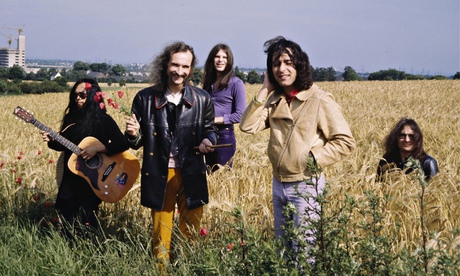
At the dawn of the 1970s, British rock had sunk into the mellow denim heaven of Linda Ronstadt, the Eagles and other American middle-of-the-roadsters. The music was saturated in proto-hippy blues-rock cliches, and had little fun or frivolity to recommend it. Then came Roxy Music, whose first, eponymous album, in 1972, challenged the denim scene. On the cover was a Hollywoodesque British pin-up girl. Such a wry pop statement had not been seen since Andy Warhol's "banana album" for the Velvet Underground. The second Roxy album, For Your Pleasure, altered British pop for good with its amalgam of Leiber and Stoller, jazz and so-called Krautrock, heralding Sparks and, two decades later, Pulp.
According to David Stubbs, Roxy Music were the first British group to be influenced by Krautrock. Brian Eno brought a loopy synth sound and highbrow electronic experimentation to Bryan Ferry's songwriting. Behind Roxy's pop-art experiment were the long hypnotic threnodies of Can, Faust and early Kraftwerk. It is enough to listen to Roxy's The Bogus Man or In Every Dream Home a Heartache to hear the influence.
A contentious term, Krautrock was first used by the British music press in the late 1960s. It was given a boost by Julian Cope, the well-read jester of English pop, in his scholarly volume Krautrocksampler (1995), which commended the new music that grew out of the moral and material ruins of post-Hitlerite Germany.
In his own Krautrock history, Future Days (titled after the Can album of 1973), Stubbs relates that Germany in the aftermath of its zero hour had given rise to a generation of children who wanted to know about their parents' wartime past. The 1950s and 1960s were difficult decades for the German conscience; any resistance against the German state could be justified by the Nazi past. Baader-Meinhof terrorists were able to count on a degree of sympathy among the young because they dared to do what almost all Germans had failed to do when it really mattered, some 30 years before: stand up to state authority.
Krautrock grew out of this "spirit of combativeness and resistance", says Stubbs. One of the more wayward Krautrock bands, German Oak, went so far as to sample Hitler's Nuremberg speeches over percussive instrumentals with titles like 1945 – Out of the Ashes. The intended effect was to ridicule.
As a term, Krautrock was disliked by most of the German bands it purported to describe. It is not hard to see why. Imagine the moral outrage, says Stubbs, if a British journalist had chosen to dub the Hendrix sound "spaderock". Krautrock is nowhere near as dubious a term; if anything it reveals a lingering British fear and loathing of Germany and the Germans. NME Krautrock articles from the mid-1970s carried such dodgy straplines as "Can: They Have Ways of Making You Listen", or "Kraftwerk: The Final Solution to the Music Problem".
Some German commentators prefer kosmische music as a term; it suits the atmospheric sound clusters of Popol Vuh and the pulseless drones of Tangerine Dream, but not, in the end, the industrial kling-klang of Kraftwerk. We may as well stick with Krautrock, says Stubbs. In a fascinating chapter, he looks at the appeal of pre-glasnost East Germany for David Bowie and Brian Eno, who together revered the Krautrock electronic bands Cluster and Harmonia. With its shadowy Harry Palmer atmosphere, communist Berlin was a melancholy place in the 1970s, hemmed in by border guards and barbed wire. Bowie found a corollary for his depressive moods, it seems, in the bleakness of the Stasi-infiltrated Soviet zone. V-2 Schneider, from his Berlin album "Heroes", is a homage to Kraftwerk's co-founder, Florian Schneider.
Like Kraftwerk, the Cologne-based band Can rejected the "square" German music scene known as schlager with its Euro-kitsch crooning, and evolved a repetitive, drum-driven dancefloor groove that borrowed as much from North African music as from Stockhausen and the American minimalists Steve Reich and Terry Riley. Ege Bamyasi, Can's abidingly great album of 1972, featured a Warhol-like image of tinned Turkish food on the cover, and was very far removed from the tepid, well-mannered British prog of Genesis and Yes. Jaki Liebezeit, Can's jazz-trained drummer, rejected arty rock posturing in favour of an egalitarian studio experimentation. ("No Führers!" he tells Stubbs.)
Three decades have passed since Krautrock petered out in the mid-1970s, but its effect on British bands today is evident (the Horrors, Toy and Deerhunter are all Krautrock devotees). Stubbs, a former Melody Maker journalist, is prone at times to hyperbole ("we're on the point of gladly being swallowed up by the sun", he writes of Can's incandescently beautiful Future Days album). Yet his book is so well researched and filled with such enthusiasm for its subject that it absorbs from start to finish. Just don't mention the war.
Future Days is published by Faber (£20). Click here to buy it for £14.49 with free UK p&p

